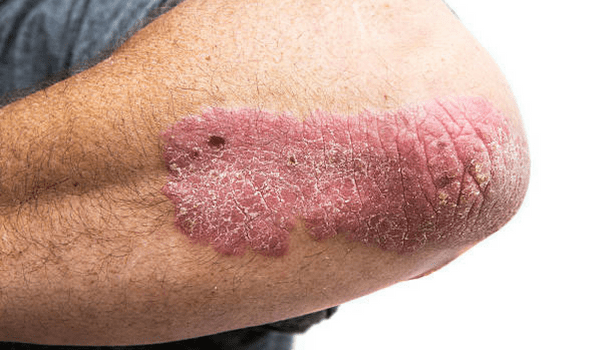
What is Psoriasis?
Psoriasis is a common chronic skin disease that generally appears as patches of raised red skin covered by a flaky white buildup. More than 4.5 million adults in the United States have some type of psoriasis. In general, the condition is frequently found on the knees, elbows, scalp, hands, feet or lower back. Certain types of psoriasis may also have a bumpy appearance and cause intense itching and burning. The condition comes in different forms and varying levels of severity and is among the many conditions board-certified dermatologists treat.
The thick, scaly patches that develop on the skin are called plaques. About 80% to 90% of people living with psoriasis get plaques. This type is called plaque psoriasis and is the most common type. The plaques usually vary in size and they can appear as a single patch or join together to cover a large area of skin. These plaques tend to be itchy and some people notice that their skin burns or feels painful and tight.
Types of Psoriasis
There are many many types of psoriasis, including:
- Plaque psoriasis
- Guttate psoriasis
- Inverse psoriasis
- Pustular psoriasis
- Erythrodermic psoriasis
- Nail psoriasis
- Psoriatic arthritis (psoriasis of the joins)
What Causes Psoriasis?
Psoriasis is not contagious. Despite common myths, it cannot be caught by touching someone who has the skin condition or swimming in a pool with someone who has it. Most researchers now conclude that it is related to the immune system, often called an “immune-mediated” disorder.
White blood cells, also called T-cells, are part of the body’s immune system. These cells help prevent us from getting sick by attacking harmful things such as bacteria and viruses. If you have this condition, there is increased activity of these T-cells in the skin that causes inflammation. This inflammation causes the body to make new skin cells more often, leading to the extra skin cells that pile up on the surface of the skin.
Genetics can also play a role in developing the condition. It is known that psoriasis runs in families and scientists have found that people who have certain genes are more likely to get the condition. However, it’s also possible to have genes that increase the risk of getting psoriasis and still never develop it. This discovery has led scientists to believe that there may also be certain triggers that lead to the development of psoriasis. Common triggers include: stress, a skin injury, infection, certain medications, weather, alcohol, and tobacco.
See a Dermatologist
Psoriasis tends to be a life-long disease, so it’s helpful to become well educated on the disease and see a board-certified dermatologist. Understanding psoriasis can help you gain control of your condition. This can mean clearer (or clear) skin, improvement of overall health, and prevention of disease worsening. This is often achieved by learning and avoiding what triggers your psoriasis, sticking to a good skin care routine, living a healthy lifestyle, and using medication when necessary.
At Vujevich Dermatology Associates, we understand psoriasis and psoriatic arthritis are both physically and mentally distressing chronic conditions for patients and their families. These conditions require specialized treatment regimens tailored to the individual patient.
Wondering if you or someone you know has psoriasis? Our board-certified Pittsburgh dermatology group can to make this diagnosis. There is no blood test for the disease. The condition may be diagnosed by a simple skin exam or, sometimes, by removing a small piece of affected skin and examining it under a microscope. Learn more about this condition and our Psoriasis Treatment Center today.
Vujevich Dermatology Associates offers medical, surgical, and cosmetic dermatology from some of the most highly trained physicians and clinicians in the greater Pittsburgh area. You can reach our team at 412-429-2570 or visit our contact page to see all of our locations. You can also follow us on Facebook to see what’s new in the world of dermatology.
